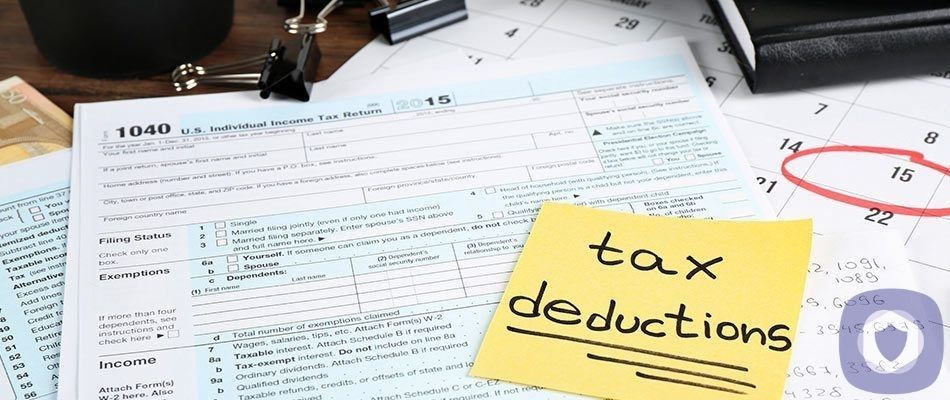We’re all trying to save a dollar where we can, so you may wonder, “Is my home security system tax deductible?” It’s a good question, but, unfortunately, the answer is no in most cases. There are, however, a few exceptions in which you can take a tax deduction for installing and monitoring a home security system.
Here’s what you need to know about home security systems and tax deductions as well as other ways to save when it comes to keeping your home safe.
When a home security system may be tax deductible
According to the Internal Revenue Service (IRS), the cost of a home security system can’t be deducted as a personal expense. You may be able to deduct it, however, if you have a home office that qualifies as such under IRS guidelines.
What qualifies as a home office?
It doesn’t matter if you rent or own your home, you can claim a home office deduction if the space you wish to qualify as one meets the IRS stipulations. While there are some caveats, in general, to qualify as a home office, your home office meet two basic rules:
1. Regular and exclusive use
Your home office must be used on regular basis for work and for work only. In other words, if you set up your laptop at the dining room table, then move it when it’s dinnertime, that doesn’t qualify. Nor does it qualify if your home office is also the place your kids do their homework or watch TV when you’re not working. Instead, it must be a room or a sectioned-off portion of a room where you consistently work that’s not used for anything else. (If you have people in and out of your home routinely, you’ll want to look at getting a laptop lock.)
Also, if you use a portion of your home as a daycare facility, it may qualify as a home office.
2. The principal place you do business
Your home office also must be where you do most of your business or somewhere you meet with clients or customers.
It can also be a separate structure, such as a garage or studio that’s used in connection with your work. In that case, it doesn’t have to be the primary place you do business, but it must meet the regular and exclusive use requirements.
How to claim a home security system on your taxes
If you determine that your home office qualifies as such on under the IRS guidelines, then you may be able to deduct the costs of a home security system, including installation and monitoring. To do so, however, you have to choose the regular rather than simplified option when it comes to filing.
Simplified vs. regular tax filing
The simplified option is much like it sounds—simpler than the regular option. Instead of deducting every individual expense, you get a blanket credit that’s determined by multiplying the square feet of your office (up to 300 square feet) by a prescribed rate (currently $5). In that case, your home security system doesn’t affect your taxes. If, however, you choose the regular option, you can receive a deduction for your home security system.
Direct vs. indirect costs
If the security system only covers your home office, it’s considered a direct cost, and you can deduct the entire cost of installation and monitoring. If the security system covers your entire house, however, then it’s considered an indirect cost and you may only claim the percentage of it that covers your home office. For example, if your house is 1,000 square feet, and 250 square feet qualifies as a home office, then you can only deduct 25 percent of the cost of your security system. You also can deduct a portion of the deprecation cost of the security system.
Be sure to keep all receipts and records to make tax time easier. To file home office business expenses, including your home security system, use this IRS form, Expenses for Business Use of Your Home.
Other ways to save money on your home security system
Beyond tax deductions, there are other ways to save on home security systems, including the following:
Insurance discounts
While Uncle Sam may not give you a break for a home security system, your insurance company may. Many insurance providers offer a discount if you install a monitored security system. Check with your agent to see if you qualify.
Self-monitor your system
While professionally monitored home security systems provide the best security, if you can’t afford the monthly fee for professional monitoring, you can monitor it yourself. Many systems provide alerts via text and email when suspicious activity is detected, and some have cameras that can help you see what’s happening when you’re not home. You can always add professional monitoring when your budget allows.
Bottom line on home security system tax breaks and discounts
While we all want to save money when we can, your family’s safety and security are invaluable. So, even if you aren’t able to get a tax break for installing a home security system, you can rest easy knowing it’s money well spent.
This article has been reviewed and approved by Officer Banta.

Officer Banta is the official SecurityNerd home security and safety expert. A member of the Biloxi Police Department for over 24 years, Officer Banta reviews all articles before lending his stamp of approval. Click here for more information on Officer Banta and the rest of our team.

